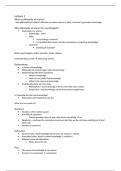Samenvatting
Philosophy of Science - Summary, Tilburg University (7,5)
- Instelling
- Tilburg University (UVT)
A summary of the course Philosophy of Science. The summary consists of the lectures given by the two professors. If you have any questions, you can message me :)
[Meer zien]





